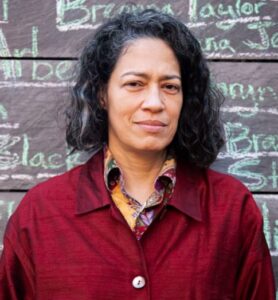
Jalane Schmidt
by Walter Smith
University of Virginia President Jim Ryan has repeatedly stated that the Thomas Jefferson statue in front of the Rotunda will not be removed on his watch. However, after reading UVA Today and viewing his personnel appointments, I get the distinct impression there is either an expiration date on this promise or that a parenthetical “for now” is attached.
UVA Today, the administration’s house organ, linked to an NPR interview with Jalane Schmidt, who is director of The Memory Project, a part of UVa’s Democracy Initiative, which was founded by the College and Graduate Arts and Sciences schools and The Miller Center. Ms. Schmidt is described as a religious studies professor and Black Lives Matter activist.
This is The Memory Project’s self-description:
With funding from the Mellon Foundation and the Democracy Initiative, The Memory Project will promote research, develop curricula and programming, and create opportunities for public engagement to address issues of public memory, memory conflict, and memory politics in the wake of the right-wing violence that came to Charlottesville in August 2017. As the events of 2017, the legacies of slavery in the United States, and the problematic history of Charlottesville and the University in particular raise a host of unique challenges for scholars, policy makers, and public officials, The Memory Project aims to demonstrate that Charlottesville and the University of Virginia are at the forefront of a growing trend toward a more objective examination of the past in the service of creating a more equitable and ethical future.
I am not exactly sure what that means. I hear a lot of euphemisms and academic buzzwords to hide what is truly intended – “opportunities for public engagement,” “public memory,” “memory conflict,” “memory politics,” “legacies of slavery,” “problematic history of…the University,” “a more objective examination of the past in the service of creating a more equitable and ethical future.” I am surprised they left out intersectionality and multi-discipline! (Don’t worry – you can check the People tab and see they’ve covered those bases.)
Am I missing something or can you make sense of “public memory” or “memory conflict” or “memory politics”? I thought memory involved remembering something. Does the phrase “a more objective examination of the past” mean that all prior evaluations and discussions were not objective, but that examinations by more enlightened people will create a more equitable and more ethical future?
Let’s not kid ourselves. The Memory Project will be Marxist propaganda to frame a “narrative” of white supremacy and invalidation of Western Civilization. The self-anointed “enlightened” ones must speak in vague, high-falutin’ obfuscations because most people who received an education before 2000 will know that Western Civilization, for all its imperfections, has produced the greatest wealth and freedom and knowledge of any society in the history of the planet.
Please read Ms. Schmidt’s interview and see if you can make ANY sense of what she is in charge of doing, because I can’t.
As for me, if we must be subjected to a re-writing of history by The Memory Project, I would like to participate and remember the hundreds of millions of people murdered by adherents to Marxism and the suffering caused by the breakdown of the nuclear family, which the Black Lives Matter movement is eager to accelerate. Because, you know, I want an “objective examination” leading to a “more equitable and ethical future.”




Great article, Walter! I agree. The arrogance and “enlightenment” of The Memory Project is clear. Thank you for sharing your perspective.